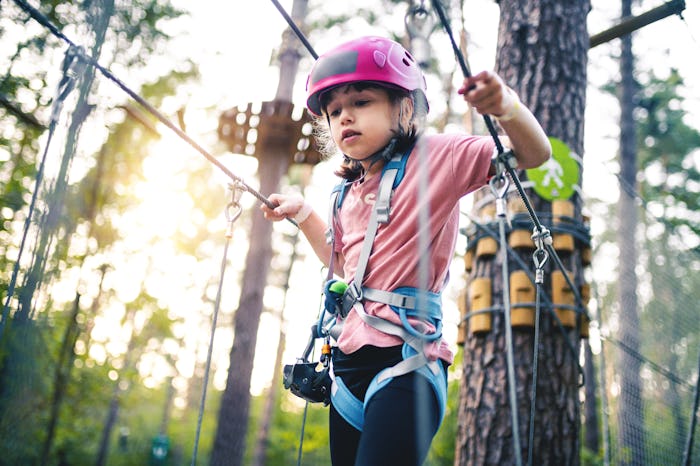Life

Encouraging Your Child To Be Brave Means You're Empowering Them, Experts Say
When you child tries new things, they often need a bit of encouragement. If they seem hesitant to climb a tree or try out for the baseball team for risk of falling or failure, you may have to step in to encourage your child to be brave. Your kid won't always like it when you do, and your mind might fill with doubt: Did you push too hard? Not enough? Should you just let them be already?
When your kid takes a leap of faith and steps out to do something outside of their comfort zone, it can be a major confidence boost, but some kids don't innately know when and how to be courageous. They look up at a tall tree towering over them, get spooked, and refuse to attempt to climb it. Sometimes even your best "You got this!" isn't enough of a push to spark the sense of bravery needed to accomplish tasks that seem insurmountable to a child.
"It's important for parents to encourage bravery in children because acts of bravery build self-esteem, resilience, and self-advocacy," Darby Fox, a child and adolescent family therapist practicing in New York tells Romper. "Bravery or courage is the foundation of a strong sense of self and inner compass that are increasingly important as we get older and need to overcome obstacles that we can't control."
Fear not, parents of kids who need a little help finding their courage, experts say it is completely possible to encourage your child to be brave without scarring them for life. It all boils down to supporting your child in the decisions they make and letting them know that it's OK to speak up or take risks.
"Bravery is the feeling of courage. A child needs courage to effectively handle their big emotions, and also try new experiences," Maureen Healy, child psychologist, author of The Emotionally Healthy Child, and parenting coach at Growinghappykids.com tells Romper. "In my book, I share suggestions on how to build the necessary ability to be brave. For example, you can help your child visualize him or herself as a superhero who is brave and courageous. This is one very effective technique, but there are more."
In addition to Healy's visualization technique, Fox explains that helping a child learn when and how to speak up for themselves can be beneficial in encouraging bravery.
"One way for parents to encourage their child to be brave is to teach them early on how to speak to a coach or teacher when they are disappointed or don't understand something or want to know how they can improve," Fox explains. "Many parents try to intervene on their child's behalf, but it's so important that as early as possible, parents are encouraging and empowering children to speak up for themselves. Parents can also encourage children to branch out and step outside of their comfort zone by trying something new."
Each of these ideas serves to benefit your kids by providing a boost of confidence in their own abilities. It's not so much about forcing kids to do or say things that makes them uncomfortable as it is letting them know that you have faith in their abilities.
"Another area in which parents can encourage bravery in their children is to teach them to stand up for their friends and act on behalf of the 'underdog,' such as when a peer is being bullied at school," Fox says. "Smaller examples might be saying 'I'm sorry,' and being willing to admit when they're wrong."
When you encourage your child to be brave in their words and in their actions, you are giving them the strength they need to tackle all that life will throw their way. "Every child needs to be brave so they can develop grit, resilience and the capacity to manage their emotions effectively. Bravery is one of the key ingredients for positive emotional health," Healy tells Romper. "The opposite of bravery is considered being fearful, and that isn't a helpful emotion or state of mind."
Experts:
Maureen Healy, child psychologist, author of The Emotionally Healthy Child, and parenting coach at Growinghappykids.com
Darby Fox, child and adolescent family therapist practicing in New York